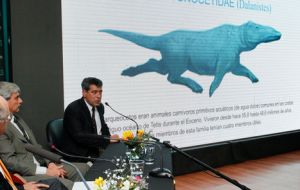MercoPress. South Atlantic News Agency
Argentine-Swedish team discovers 49 million-years fossil of fully aquatic whale in Antarctica
 Argentine palaeontologist Marcelo Reguero made the presentation showing pictures of the discovery
Argentine palaeontologist Marcelo Reguero made the presentation showing pictures of the discovery The jawbone of an ancient whale found in Antarctica may be the oldest fully aquatic whale yet discovered, Argentine scientists said Tuesday. The discovery took place close to the Argentine Antarctic base of Marambio next to the Weddell Sea.
Argentine palaeontologist Marcelo Reguero, who led a joint Argentine-Swedish team, said the fossilized archaeocete jawbone found in February dates back 49 million years. In evolutionary terms, that's not far off from the fossils of even older proto-whales from 53 million years ago that have been found in South Asia and other warmer latitudes.
Those earlier proto-whales were amphibians, able to live on land as well as sea. This jawbone, in contrast, belongs to the Basilosauridae group of fully aquatic whales, said Reguero, who leads research for the Argentine Antarctic Institute.
“The relevance of this discovery is that it's the oldest known completely aquatic whale found yet,” said Reguero, who shared the discovery with Argentine palaeontologist Claudia Tambussi and Swedish palaeontologists Thomas Mors and Jonas Hagstrom of the Natural History Museum in Stockholm.
The jawbone was found in the Marambio island could correspond to an adult, 6 to 7 metres long, and given the wear of the teeth it is believed to have been a great predator probably feeding on penguins among other sources.
According to the Argentine-Swedish team other fossils exist in the area but have to be checked to see if they belong to the same specimen. The jawbone is being restored in special labs in Puerto Madryn. A full report on the findings and the current campaign will be presented at the Society of Vertebrate Palaeontology in Las Vegas.
Paul Sereno, a University of Chicago palaeontologist who wasn't involved in the research, said that if the new find withstands the scrutiny of other scientists, it will suggest that archaeocetes evolved much more quickly than previously thought from their semi-aquatic origin in present-day India and Pakistan.
“The important thing is the location,” Sereno said. “To find one in Antarctica is very interesting.”




Top Comments
Disclaimer & comment rules-

Read all commentsas long as its not one of your decendents
Oct 12th, 2011 - 07:38 pm 0Commenting for this story is now closed.
If you have a Facebook account, become a fan and comment on our Facebook Page!